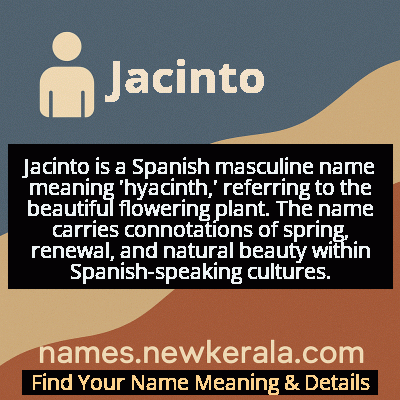Jacinto Name Meaning & Details
Origin, Popularity, Numerology Analysis & Name Meaning of Jacinto
Discover the origin, meaning, and cultural significance of the name JACINTO. Delve into its historical roots and explore the lasting impact it has had on communities and traditions.
Name
Jacinto
Gender
Male
Origin
Spanish
Lucky Number
9
Meaning of the Name - Jacinto
Jacinto is a Spanish masculine name meaning 'hyacinth,' referring to the beautiful flowering plant. The name carries connotations of spring, renewal, and natural beauty within Spanish-speaking cultures.
Jacinto - Complete Numerology Analysis
Your Numerology Number
Based on Pythagorean Numerology System
Ruling Planet
Mars
Positive Nature
Generous, passionate, energetic, and humanitarian.
Negative Traits
Impulsive, impatient, moody, and can be overly emotional.
Lucky Colours
Red, maroon, scarlet.
Lucky Days
Tuesday.
Lucky Stones
Red coral, garnet.
Harmony Numbers
1, 2, 3, 6.
Best Suited Professions
Military, sports, philanthropy, leadership roles.
What People Like About You
Courage, energy, leadership, generosity.
Famous People Named Jacinto
Jacinto Benavente
Playwright
Nobel Prize in Literature winner (1922) for his contributions to Spanish theater
Jacinto Canek
Maya Revolutionary Leader
Led the 1761 Maya revolt against Spanish colonial authorities in Yucatán
Jacinto Convit
Physician and Scientist
Developed vaccine for leprosy and made significant contributions to tropical medicine
Jacinto Guerrero
Composer
Renowned Spanish zarzuela composer known for 'Los Gavilanes' and other popular works
Name Variations & International Equivalents
Click on blue names to explore their detailed meanings. Gray names with will be available soon.
Cultural & Historical Significance
During the colonial period, the name spread throughout Latin America where it became associated with both indigenous resistance figures and Catholic saints, creating a complex cultural tapestry that reflects the region's mixed heritage. In Mexico, Jacinto Canek became a symbol of indigenous resistance, while in the Philippines (another former Spanish colony), the name maintains popularity and cultural relevance. The dual nature of the name—connecting both to European Catholic traditions and indigenous histories—makes it particularly significant in understanding the cultural dynamics of Spanish-speaking societies.
Extended Personality Analysis
Individuals named Jacinto are often perceived as creative, passionate, and deeply connected to their cultural roots. They tend to possess an artistic sensibility and appreciation for beauty, reflecting the floral origins of their name. Jacintos are typically known for their loyalty and strong family values, often serving as pillars within their communities. Their personality combines traditional values with modern adaptability, making them respected figures who bridge generations.
Many Jacintos display a quiet strength and resilience, capable of weathering challenges while maintaining their core principles. They often excel in fields requiring both creativity and discipline, balancing emotional depth with practical wisdom. The name suggests someone who is both grounded and visionary, able to appreciate tradition while embracing progress. Their communication style tends to be thoughtful and considered, and they often become trusted advisors or mentors within their social and professional circles. The combination of artistic sensitivity and practical capability makes Jacintos particularly effective in roles that require both innovation and stability.
Modern Usage & Popularity
In contemporary times, Jacinto maintains steady usage in Spanish-speaking communities, though it has become less common among younger generations. The name experienced peak popularity in the mid-20th century and now carries a classic, somewhat traditional feel. It remains particularly popular in rural areas and among families with strong Catholic traditions. While not among the top 100 names in most Spanish-speaking countries today, it continues to be chosen by parents seeking a name with historical depth and cultural significance. The name has seen some revival among educated urban families who appreciate its literary and botanical connections, and it occasionally appears in creative works that seek to evoke traditional Spanish or Latin American cultural themes.
Symbolic & Spiritual Meanings
Symbolically, Jacinto represents beauty, transformation, and spiritual growth. The hyacinth flower from which the name derives symbolizes constancy and the fleeting nature of life in Western floral symbolism. In Greek mythology, the hyacinth emerged from the blood of the youth Hyacinthus, representing rebirth and the cycle of life and death. The purple hyacinth specifically symbolizes sorrow and asking for forgiveness, while blue varieties represent consistency. The name carries connotations of spring, renewal, and the delicate balance between strength and fragility. It suggests someone who can find beauty in difficult circumstances and transform challenges into opportunities for growth, embodying the resilience of nature and the human spirit's capacity for regeneration.

